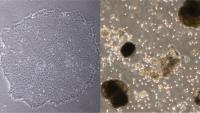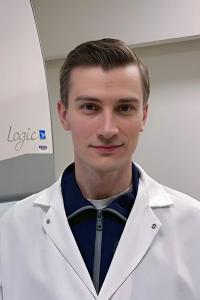Doulatov Lab

Principal Investigator
Normal and malignant hematopoietic stem cells
The Doulatov lab studies the biology of hematopoietic stem cells (HSCs) and how acquisition of oncogenic mutations transforms HSCs into myeloid malignancies, including myelodysplastic syndromes (MDS) and acute myeloid leukemias (AML). We leverage patient-derived induced pluripotent stem cells (iPSCs) and gene editing of primary human HSCs to develop models and study how mutation cooperation drives malignant transformation. Our long-term goal is to identify fundamental mechanisms of disease and to develop targeted therapies to eradicate malignant stem cells.
Human HSCs reside in the bone marrow and sustain life-long hematopoiesis. Over decades, HSCs can acquire oncogenic mutations that confer competitive advantage to HSCs leading to clonal expansions. Over time these premalignant states can progress to leukemias due to complex interplay between mutations and environmental factors. We showed that iPSC reprogramming can capture the HSC genetic clones and inform the order and contribution of somatic mutations in clonal evolution (Hsu et al. Blood 2019). Using the iPSC and primary human model systems, our research seeks to uncover fundamental mechanisms by which genetic driver mutations promote clonal expansion and progression from premalignant to neoplastic states.
Research Projects
Splicing factor SF3B1 mutations in MDS
Change-of-function mutations in the spliceosomal gene SF3B1 are recurrent and frequent somatic lesions that alter RNA splicing in premalignant clonal hematopoiesis and ~30% of patients with MDS. We are studying how aberrantly spliced gene isoforms generated by mutant SF3B1 dysregulate hematopoiesis and erythropoiesis leading to MDS. We recently identified mis-splicing of mitochondrial genes TMEM14C and ABCB7 as the cause of ring sideroblast formation in MDS (Clough et al. Blood 2022; cover image). We also uncovered inhibition of CHK1 as a selective therapeutic vulnerability of SF3B1 mutated HSCs (Sarchi et al. Blood Cancer Discovery 2024).
Evolution of aneuploidy in myeloid malignancies
An abnormal chromosome complement, or aneuploidy, is a hallmark of high-risk myeloid malignancies with TP53 mutations and complex karyotype (AML-CK). We are studying how aneuploidy first arises in HSCs and how it evolves to AML-CK using a novel iPSC model system in which normal HSCs evolve to complex aneuploidies. Current work is focused on the role and genetics of chromosome 5q deletions in AML-CK and therapeutic targeting of aneuploidy.
Nuclear lamins and genome organization
The spatial organization of the genome inside the nucleus is essential for hematopoietic fate determination, and is often perturbed in leukemic transformation. We uncovered lamin B1 as the key regulator of HSC function and nuclear morphology (Reilly et al. Cell Stem Cell 2022). We are studying genome organization and its regulation by lamins in normal and neoplastic hematopoiesis.
The image depicts two chefs cooking a bowl of “noodle chromatin”, one with LMNB1 and one deprived of it. With LMNB1, chromatin is organized and HSC fate is normal. Without LMNB1, on the right, chromatin is disorganized leading to altered HSC fate, nuclear anomaly, and disrupted DNA repair shown by the broken bowls at the end of the conveyor belt. Illustration developed for Reilly et al. 2022 by Emma Vidal.
Lab Members
J. Philip Creamer, PhD
- Associate Research Scientist

Suhita Ray, PhD
- Postdoctoral Research Scientist

Xiaoyi (Chelsea) Cheng, PhD
- Postdoctoral Research Scientist

Laura Baquero Galvis
- PhD Student

Ruowei Zhu
- PhD Student

Select Publications
Wellington R, Cheng X, Dutta S, Campbell CA, Trapnell C, Espin-Palazon R, Hadland B, Doulatov S. Developmental regulation of endothelial-to-hematopoietic transition from induced pluripotent stem cells. Stem Cell Reports. 2025 Oct 14;20(10):102641. PMID: 40972587.
Sarchi M*, Clough CA, Gallì A, Picone C, Ferrari B, Crosse EI, Baquero Galvis LD, Fiducioso C, Aydinyan N, Creamer JP, Pozzi S, Molteni E, Elena C, Bradley RK, Malcovati L*, Doulatov S*. Distinct routes of clonal progression in SF3B1-mutant myelodysplastic syndromes. Blood Advances. 2025 Jun 24;9(12):3044-3055. PMID: 40188457; PMCID: PMC12209948.
Sarchi M, Clough CA*, Crosse EI*, Kim J*, Baquero Galvis LD, Aydinyan N, Wellington R, Yang F, Galli A, Creamer JP, Stewart S, Bradley RK, Malcovati L*, Doulatov S*. Mis-splicing of mitotic regulators sensitizes SF3B1-mutated human HSCs to CHK1 inhibition. Blood Cancer Discovery. 2024 Sep 3; 5(5):353-370. PMID: 38856693; PMCID: PMC11369594.
Reilly A, Creamer JP, Stewart S, Stolla MC, Wang Y, Du J, Wellington R, Busch S, Estey EH, Becker PS, Fang M, Keel SB, Abkowitz JL, Soma LA, Ma J, Duan Z, and Doulatov S. Lamin B1 deletion in myeloid neoplasms causes nuclear anomaly and altered hematopoietic stem cell function. Cell Stem Cell. 2022 Apr 7; 29(4):577-592.e8. PMID: 35278369; PMCID: PMC9018112.
Clough CA, Pangallo J*, Sarchi M*, Ilagan JO*, North K, Bergantinos R, Stolla MC, Naru J, Nugent P, Kim E, Stirewalt DL, Subramaniam AR, Abdel-Wahab O, Abkowitz JL, Bradley RK* and Doulatov S*. Coordinated mis-splicing of TMEM14C and ABCB7 causes ring sideroblast formation in SF3B1-mutant myelodysplastic syndrome. Blood. 2022 Mar 31; 139(13):2038-2049. PMID: 34861039; PMCID: PMC8972092.
Hsu J, Reilly A, Clough CA, Hayes BJ, Konnick EQ, Torok-Storb B, Gulsuner S, Wu D, Becker PS, Keel SB, Abkowitz JL, and Doulatov S. Reprogramming identifies functionally distinct stages of clonal evolution in myelodysplastic syndromes. Blood. 2019; 134:186-198. PMID: 31010849.








